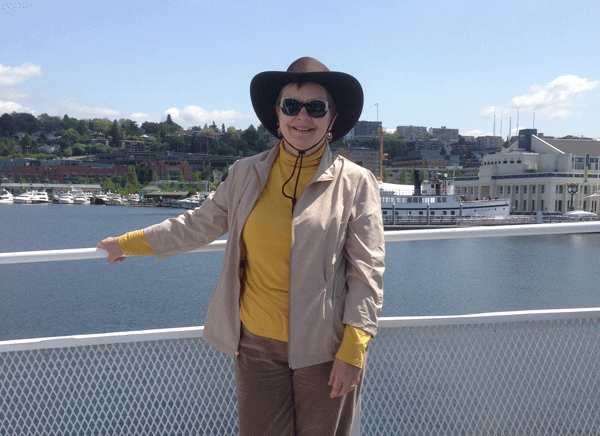A Life on Stage
Downtown Seattle - 2013
Common Sense Reflections has a guest blogger today. Partly hidden behind Seattle’s beautiful views is the problem of poverty and homelessness which this blog post addresses. Author Carolyn Duncan is a resident of West Seattle whose commute to downtown Seattle was lengthened and rerouted through the White Center area due to the necessity of emergency repairs to the West Seattle Bridge.
Carolyn Duncan
Guest Blogger
How would it affect you to have a recurring view of sidewalks and parking lots dotted with a sea of small tents, miscellaneous clutter, and sheds made of cast-offs? Would you look the other way and ignore it or stress about how depressed it makes you to see the effects of poverty in the city? Would you guess the identity and personal story of the sidewalk dwellers and try to imagine how you might help them? Would you stop your vehicle and inquire about their well-being while bringing products you think might be of assistance? Would you research agencies that help homeless people find permanent shelter and offer your assistance? Would you conclude that systemic change is needed and work to reverse income inequality, and to enhance the availability of mental health services, a guaranteed minimum income, free healthcare, and subsidized housing? Carolyn Duncan attempted to engage with a sidewalk resident. Here’s her story of how it worked out.
Mount Rainier and Seattle Waterfront - 2013
“All the world's a stage,
And all the men and women merely players;
They have their exits and their entrances,
And one man in his time plays many parts…Last scene of all,
…mere oblivion, sans teeth, sans eyes, sans taste, sans everything”
Excerpt from a monologue in the play
As You Like It by William Shakespeare
A Life on Stage - by Carolyn Duncan
We West Seattleites have one way off the peninsula now that the high-rise bridge over the Duwamish River is perilously cracked. The detour to downtown sends us south through White Center, across the First South Bridge and then north or east through the industrial area. This detour unexpectedly gave me a Shakespearean experience where “all the world’s a stage” as it lifted the curtain on one woman’s life. I was one in an audience of thousands who saw only glimpses of the stage and the life played. It was a drama in scenes of two or three-seconds, as we swooshed by at 45 miles-an-hour; people with purpose driving SUVs, semi-trucks, cement mixers and freight trains. We, along with the sterile streets and buildings, are the economic engine of Seattle and the entire state. She is a clunk in that humming engine that creates tens of billions of dollars each year. A clunk in the engine that no one seems able to repair no matter how much we try.
The first act in this tragedy began last spring when a wooden, slant-roof shack, much like a strawberry field-boss’s shed, appeared one day on the sidewalk at East Marginal Way and Orcas Street. A wooden thumb of a building, alone on the cement sidewalk across from the Banner Bank billboard, and a big, anonymous factory venting clouds of steam.
White curtains fluttering out a hole cut for a window catch my eye and touch my heart as I drive by on a warm spring evening. How charming. How out of place. It must be a woman setting up house. I wonder where she got the curtains. They look like eyelet lace. Then I think this is not charming. A homeless person is so desperate she is living on a busy street corner. The curtains are nice, but will she be safe?
The house is nurtured and loved. At least that’s what it looks like to me. Each time I pass, I notice new amenities—a flower box, a rickety book case. The house gets an addition. I never see the proprietress. But the eyelet curtains are a flag of hope and affection that I can’t give to some homeless people I’ve encountered.
Forty years working downtown gave me a near-daily mix of experiences, and a complex set of feelings toward the homeless. Some days it was wild at my bus stop. Walking to my office I steeled myself not to be afraid of jittery men panhandling or dealing drugs and mentally ill people defecating, shouting, cursing and sometimes lashing out. I genuinely ached for people I saw sleeping in doorways as I walked. I became sorrowful for people I didn’t see but learned were out there: parents with children, the working poor, the elderly. But now, I recoil at the dirty, loud men hanging out along the row of decrepit RV’s on a side street near one of my exits. I actually resent the relatively new phenomena of tent cities along the freeway and in parks. How did it get like this?
I give this unseen person on the corner baseless, positive attributes. Do I empathize with her because I can relate to white lace curtains? I feel guilty for it. My internal debate rages: all homeless are human beings deserving my compassion whether living in a dome tent, beat up RV or shed with curtains. I have always donated to food banks and nonprofits, and faithfully bought Real Change, though I rarely have the opportunity now that I’ve retired. Now I’m driving in neighborhoods, not walking downtown, and don’t engage with the homeless like I used to.
Weeks pass. Finally, I see a person standing near the house. I’m surprised that he is tall and thin and menacing. He’s waving his arms, a crumpled fedora atop his long hair. I tell my husband Jim that this can’t be the person who put up white curtains, it has to be a woman who created this little oasis. I am suspicious this scary man harmed the real resident of the little house.
Downtown Seattle Skyscrapers and Evergreen Point Bridge viewed from Houghton Beach, Kirkland, WA - 2021
The weather warms. Activity at the corner spikes. A broken office chair sits by the door, a junk heap grows alongside. And then, there she is. She’s obviously the proprietress of the quaint little house! But if all the world’s a stage, this is a scene I wish was never written. She’s blonde and would look like one of my middle-age colleagues who worked downtown, but for the dirty, yellow wetsuit she’s wearing. It is oversized, has short legs. The sleeves have been cut off so the arm holes hang past her waist exposing her naked breasts and butt. She is furiously pulling boards off the junk pile.
I’m stunned. How could I have been so naïve and superficial? This isn’t a summer cabin. This isn’t an oasis. Her home is cold cement filled with castoffs and gas fumes. There is no dignity for her. Men ogle while in route to Ladybug Bikini Espresso and nightclub just beyond it. She’s in danger, sexually vulnerable and living a tragedy on life’s stage.
The woman is ‘home’ more often now. Sometimes she wears regular clothes, one time she’s in her underwear bathing with a bucket of water. The junk pile grows and one sad scene after another unfolds. I guess we can metaphorically call it the second act when I decide in September to give her direct help. I no longer can just hope she’ll somehow benefit from a few hundred dollars I give yearly to a nonprofit agency. I struggle over what to give her. Would someone steal the money if I give her cash? I decide to give her my down ski jacket and a blanket. Once I talk to her I’ll know better what else she needs. Jim and my friends think I’m on the right path. But what if she won’t talk to me? What if she screams or lunges at me, as happened once years ago near my office?
The weather becomes stormy and cool, yet I haven’t yet gathered the coat and blanket. Jim and I drive to town one Sunday night. The white curtains are gone. A dirty, purple satin quilt is tacked over the window.
Monday, while on errands, I’m thinking of her. I abruptly change directions and drive toward the little house. I feel disoriented as I approach Orcas Street. Something is wrong. Maybe I’m at the wrong place. Then I slowly connect the “Got Junk” dump truck and two men with wide shovels to the missing house. I gasp. A mix of emotions wash through my body. The shack is gone and they are shoveling her stuff. I blink hard and try refocusing my eyes as if that will help me make sense of what I see. An unraveling straw beach bag hangs on the cyclone fence, water bottles and whole onions roll among clothes, boards, and filth. Not dirt. Black, smelly, ugly filth.
I didn’t help her. Chills race across my skin. Where is she? I’m sick at the thought of what could be. Did her relatives find her and take her for help? Or was she evicted, angry and lost? Is she safe?
The workers look at me curiously. I roll down my window and ask them if the city hired them. No, they say, it was the owners of the commercial bakery one block over. “She’s been gone for five days, you know,” one of the young men gently says.
“No, I didn’t know,” I say. We speak with a sort of reverence for her. “I drove by last night and there was a quilt on the window but I didn’t see her. I’ve been watching her and worrying about her for months.”
“We have, too,” the young man softly smiles. “We wondered what would happen to her, and wondered if we’d eventually be called to do just this,” he said, gesturing to his truck. “With her gone for so long—it’s been five days—the bakery decided to clean up.” He hesitated. “It had gotten so…bad.” I quietly nod.
Still struggling, I thank them and slowly drive off, grateful to know what happened to the house rather than drive by one day to find an empty corner. I’m glad to confirm that others saw her and worried too. Yes, like Shakespeare observed, all the world’s a stage. We West Seattle drivers were the audience to scenes from one woman’s life ironically played surrounded by great wealth. It could have been an interactive play for any of us who drove by. Yet despite all of us, she slipped into oblivion, “sans everything.”
Sailboat on Lake Washington, viewed from Kirkland, WA
About Guest Blogger Carolyn Duncan
Carolyn graduated from the University of Washington with a BA in Broadcast Journalism and spent 13 years in broadcasting. She was a reporter and anchor at KIRO Newsradio 71 in Seattle; reporter, anchor and news director for Oregon Public Broadcasting Radio in Portland; and freelanced for National Public Radio. She spent twenty-five years in public relations. Notably, as Deputy Communications Director for Governor Gary Locke and Communications Director for King County Executive Ron Sims.
Carolyn wrote this essay as part of a creative writing class offered by the Swedish Multiple Sclerosis Center to people living with MS. Carolyn was diagnosed with MS in 2004. The retired professor who teaches the class has MS himself. The two-year course began in March 2020 and became a productive way for Carolyn to spend part of her time during the COVID-19 quarantine. The work of the MS writing class will be published in a book in 2022.
Carolyn lives in West Seattle with her elderly cat, Amelia, and feels fortunate to live close enough to share time with her daughter, son-in-law and pre-school-age grandsons. An obsessed gardener, she finds few things more disappointing than a rose without fragrance, so banished many beautiful but scentless tea roses from her garden. She collects vintage vases that she uses to fill her home with flowers. Carolyn paints with watercolors and also enjoys birding, boating, beach walks, and consignment stores.
Carolyn Hayek on Lake Union, Seattle - 2014






